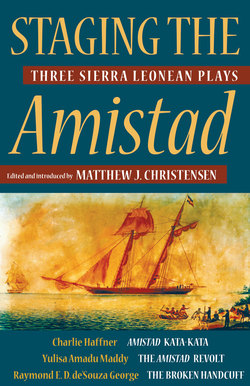Читать книгу Staging the Amistad - Charlie Haffner - Страница 15
На сайте Литреса книга снята с продажи.
ОглавлениеSCENE THREE
A typical slave baracoon. Havana, Cuba—late June, 1839. An oblong enclosure without a roof. Slaves continue to enter. Men, women, and children come stumbling in, bumping into one another, chained and bound. Some are in pain, some angry, some drugged, others dumbed. Slave Guards supervise with whips and threats. Other slave Guards bring food—boiled rice, cassava, plantains, and palm oil. Other Guards use raw palm oil to anoint slaves’ cracked skins. Then, Sengbe Pieh comes stumbling in, chained to an older man. Sengbe appears inwardly cool. He takes time to study each and what goes on around. He refuses food and water, when served. Suddenly, laughter is heard off stage. Enter Senor Reira, the baracoon owner and wealthy slave merchant, and Jose Ruiz, a young Cuban dandy who comes bartering for slaves. Ruiz is a seasoned businessman who knows his trade. Accompanying Ruiz is Antonio, a black Cuban ladino4—carrying his briefcase.
REIRA: (In heavy Cuban tongue.) . . . Eh . . . Senor Jose Ruiz.
RUIZ: Call me Pepe. That is the name everybody calls me . . . eh . . . (Introducing Antonio.) This is Antonio. He is the cabin boy of . . .
REIRA: Captain Ramon Ferrer—owner and captain of La Amistad.
RUIZ: (Shocked.) Do you know Captain Ramon Ferrer?
REIRA: Which slave dealer on this island does not know Captain Ramon Ferrer, his cabin boy, Antonio, and his mulatto cook, Celestino? (Giggles.) . . . Eh . . . Pepe, do you say that you are seeking slaves to add to your family estate plantation?
RUIZ: (Boastfully.) Yes, indeed, Senor Reira. I am seeking slaves to add to our family estate plantation in Puerto Principe. About fifty.
REIRA: Ahh . . . good man. Sugar estate plantation?
Ruiz: Sugar estate plantation.
REIRA: Good. Good man. Go ahead, Pepe. Choose. Choose fifty. It’s all yours. Go on. Choose fifty. Right?
RUIZ: Right.
They shake hands and Reira exits. With the help of assistants with practiced hands, Jose Ruiz goes over the slaves—each of the men, skipping the women and children. He opens their mouths, checks their nostrils, examines for venereal diseases and anal problems. He thumps and thwacks them. He picks out forty-nine young men, including Sengbe Pieh. Satisfied, he calls out.
RUIZ: Senor Reira! . . . forty-nine! . . . Senor Reira! . . . finito!
REIRA: (Dashing in.) Yaaa!
RUIZ: Forty-nine, Senor. I have chosen forty-nine.
REIRA: (Disappointed.) Only forty-nine? What’s the matter, Pepe? At first you said fifty, so I told you to choose fifty. Now, you choose only forty-nine?
RUIZ: Yes, only forty-nine. How much for each slave?
REIRA: Six hundred fifty dollars each.
RUIZ: Six hundred fifty dollars each? Too much, Senor.
REIRA: Not too much, Senor. See, these slaves have just arrived from Africa, west coast. Direct from the warehouse, my friend Pepe . . .
RUIZ: I give you three hundred fifty dollars each.
REIRA: Too small, Pepe. Too small. Pay six hundred dollars.
RUIZ: Still too much. Take four hundred dollars.
REIRA: No. Four hundred dollars each—not good for me. I will take five hundred dollars each. You see, Pepe, if you intend to use them in your family estate plantation, as you say, they are worth the price. These are young men—strong black Africans, healthy, not ladinos born in Cuba. You know that young, healthy, black men, just arriving from Africa always cost more on the slave market . . .
RUIZ: Okay. Four hundred fifty dollars—last I can pay, Senor. The last.
REIRA: Right. Four hundred fifty dollars each. Pay.
RUIZ: So, for forty-nine, I give you . . . eh . . .
REIRA: (Without thinking.) Twenty-two thousand fifty dollars.
RUIZ: Correct. Good man. Good dealer.
